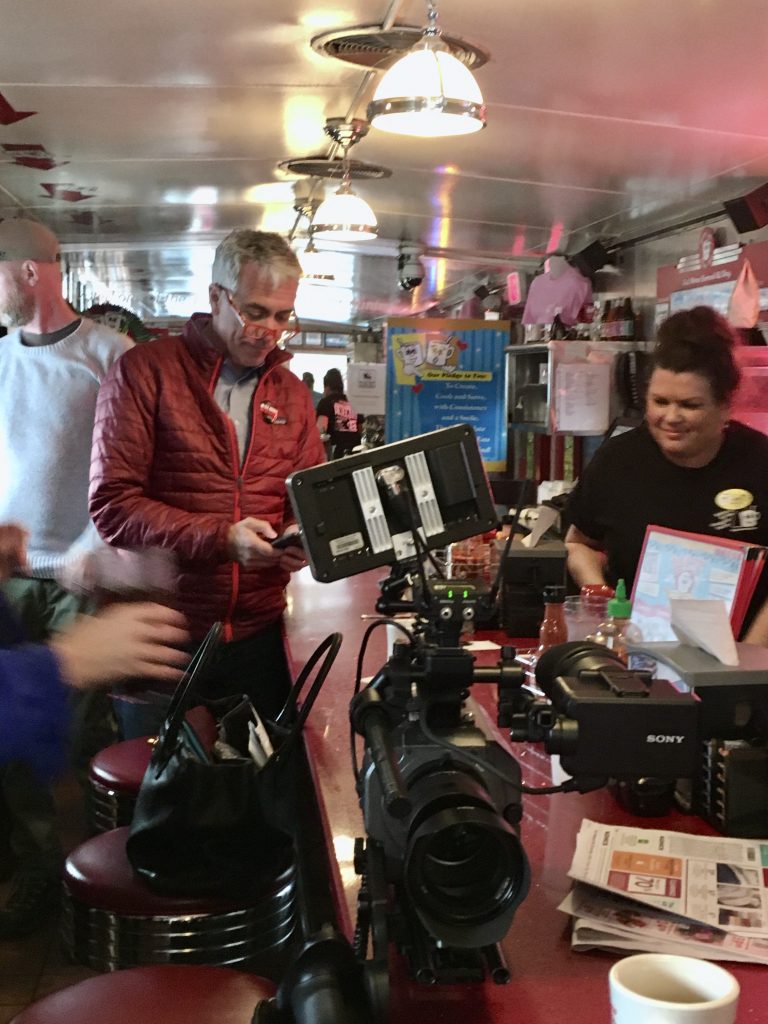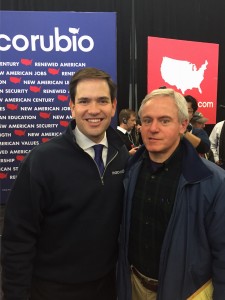I don’t know how your day went, but I met one (unknown) presidential candidate and was interviewed twice – once by a videographer for Scripps, then by a print reporter for the Union-Leader. And that was before I’d finished breakfast. To live in Manchester during primary week is to be immersed – no, saturated – in political campaigning.
Thus began my first morning in Manchester, this visit. It had snowed overnight, about three inches, so my trip to the Red Arrow Diner took place in the clean hush of a new blanket. The walk to this culinary mecca from my lodgings, about three-fourths of a mile, is downhill and I had to take care not to suddenly travel faster than intended. (The return, uphill, is good for working off one’s meal.) Point of honor: prior to walking to breakfast I shoveled out the driveway of my airbnb house, to permit a later rapid exit to the events of the day.
Settling in at the counter of the Red Arrow, I could see a fellow a few seats down from me holding forth, surrounded by media types. This, I learned, was Joe Walsh, a Republican conservative running against Donald Trump in the Republican primary. (I hadn’t known the GOP was even holding a primary. It turns out former Massachusetts Governor Bill Weld also is running, to the left of Trump.) I said hi to Mr. Walsh. Walsh is a former Illinois congressman, elected in the Tea Party wave of 2010 and defeated two years later, after which he was a conservative radio host. He backed Trump in 2016 but was disillusioned by the prez’s cozy relationship with Mr. Putin. Walsh calls Trump ‘morally unfit’ and a ‘danger to the country.’ Can’t argue with that.
I love the idea of someone running against Trump from the right but the chances of Walsh’s making even a ripple in the flow of this election cycle are zilch. (And Walsh as one might expect had his own unsavory moments, such as calling President Obama a Muslim – for which he’s now apologized. I learned that later, on looking him up.) But the man at the diner counter is a nice guy, friendly, down to earth, real. He notes sheepishly, of a waitress he apparently knows from long ago, “I used to ask her to hold my hand, when we were in school together.” She asks him if he’d go talk to a couple who have asked to meet him, and as they walk over, she holds his hand.

After Joe has gone, I’m approached by a young bearded man with a video camera who’s been shooting all sorts of things: backgrounds, waitresses, coffee mugs, impossibly high cream pies in glass domes. Having perhaps exhausted these, he turns to me, asks how I’m doing, whether I’m here for the primary, and so forth. He is Bo Evans and works for EW Scripps; learning where I’m from, he notes they have just acquired WPIX-TV in New York to add to their stable. He asks if he can film me as we talk about impressions of the primary, and the candidates. (Delighted! – stardom beckons.) As I hear myself talk I sound only slightly more interesting than the coffee mugs: Pete B. is a fresh face, out of nowhere; Bernie loves to campaign and his followers love him back; Iowa was a mess… blah blah.
I am a lousy interview, I’m sure. I can’t do this on the fly — I have to prepare!! I’ll spend tonight working up some catchy points, really I will, promise. But Bo is easily pleased. He comes back a bit later to get some gripping film of my eating my omelet and drinking coffee. Maybe I still have a chance.
Although it’s (highly) doubtful any of this will run on anyone’s news, Bo mentions that it will all be available via WPIX’s website. I’d be scared to look for it, but you dear readers are invited to search.
Then a print reporter, Mr. Hayward, stops by – I think his name was Bob but I didn’t write it down and my memory for names doesn’t serve. He actually has a physical pad and holds a physical pen, with which he writes stuff down on the pad. My heart warms to him, a fellow dinosaur facing electronic extinction. He’s with the Manchester (now ‘New Hampshire’) Union-Leader. I offer my impressions of candidates, only slightly improved from five minutes earlier, but practice helps. A fellow diner has an actually amusing anecdote of literally bumping into Rudy Giuliani back when Rudy was trying to become president four years ago – he turned suddenly in a crowd and almost knocked Rudy down – “he’s only like four feet tall, y’know, but don’t say I said that; he’s just short and I didn’t see him.” Mr. Mayor’s bodyguards were on this fellow in a hurry, but no harm done.
I expect that if Mr. Hayward’s editor is remotely competent the Rudy anecdote has a chance of surviving and my opinions, sage though they may be, do not. Still, this is what it’s like to be here. It’s what I came for, and it’s fun.
The walk uphill is made at good pace, as I lingered over breakfast and now worry I will be late for my first scheduled event, a foreign policy ‘conversation’ of Senator Amy Klobuchar with a couple of retired generals. It opens at noon at Southern New Hampshire University, maybe a 20 minute drive away. I will talk about that in the next post, along with the second event of the day, starring Pete Buttigieg. I should be able to make it; good thing I already shoveled out the car.


 Our whole conversation is as follows: “You need to adjust for the next debate.” Rubio: “We’ll be fine.” Me: “I’m rooting for you.” If he recovers from his stumble of last night, something he’s surely aware of despite his confidence, I will take full credit. I am available as campaign strategist, for a reasonable fee.
Our whole conversation is as follows: “You need to adjust for the next debate.” Rubio: “We’ll be fine.” Me: “I’m rooting for you.” If he recovers from his stumble of last night, something he’s surely aware of despite his confidence, I will take full credit. I am available as campaign strategist, for a reasonable fee.